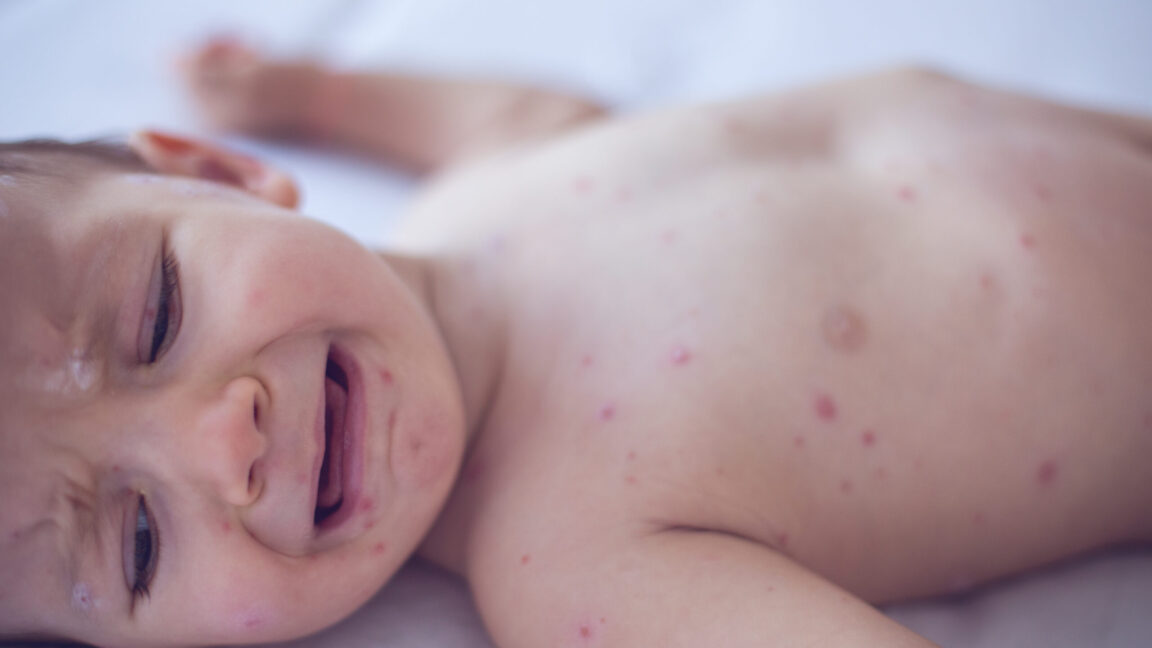Babies 6-11 months should get extra MMR dose for some domestic travel, experts say.
With measles declared eliminated from the US in 2000 and national herd immunity strong, health experts have recommended that American children get two doses of the Measles, Mumps, and Rubella (MMR) vaccine—the first between the ages of 12 and 15 months and the second between the ages of 4 and 6 years, before they start school.
Before 12 months, vulnerable infants in the US have been protected in part by maternal antibodies early in infancy as well as the immunity of the people surrounding them. But if they travel to a place where population immunity is unreliable, experts recommend that infants ages 6 to 11 months get an early dose—then follow it up with the standard two doses at the standard times, bringing the total to three doses.
The reason they would need three—and the reason experts typically recommend waiting until 12 months—is because the maternal antibodies infants carry can interfere with the vaccine response, preventing the immune system from mounting long-lasting protection. Still, the early dose provides boosted protection in that 6-to-11-month interval.
In the past, this early, extra dose was recommended for infants traveling internationally—to countries that hadn't achieved America's enviable level of herd immunity and were vulnerable to outbreaks. But now, with US vaccination rates slipping, herd immunity becoming spotty, cases rising by the day, and outbreaks simmering in multiple states, the US is no longer different from far-off places that struggle with the extremely infectious virus.
In an article published today in JAMA, prominent health experts—including former Centers for Disease Control and Prevention Director Rochelle Walensky—call for the US to update its MMR recommendations to include the early, extra dose for infants who are not only traveling abroad, but domestically, to any areas where measles is a concern.
"With some local immunization levels inadequate to avert outbreaks and ongoing disease spread in various regions of the country, a dichotomy between domestic and international travel is not appropriate," the experts write. "For many travel itineraries, there may even be a higher risk of measles exposure at the US point of departure than at the international destinations."
Vaccinating at-risk infants early is critical to their own health—as well as the people around them, the experts note. "(i)nfants younger than one year face a heightened risk of severe measles-related complications such as pneumonia, encephalitis, and death. Younger infants are also at increased risk of developing subacute sclerosing panencephalitis (SSPE), a rare measles complication that has a high fatality rate and may surface years after initial infection," according to the experts.
In addition to Walensky, the author list includes esteemed epidemiologist John Brownstein and computational epidemiologist Benjamin Rader, both experts at Boston Children's Hospital and Harvard, as well as infectious disease expert Wesley Rogers at New York University Grossman School of Medicine.
US is now highly vulnerable
Vaccinating travelers, including infants, is critical to preventing measles spread in the US. Since the virus was declared eliminated, most measles importations have been from unvaccinated US residents, who travel abroad and return home with the virus. This is particularly risky when those unvaccinated travelers return home to their unvaccinated communities.
Given the state of the US, domestic travel has become just as risky as international travel, the experts argue. Nationally, the vaccination rate among kindergartners (who should have their two standard MMR doses), fell from a high of 95 percent in 2019—the target to prevent community spread—to 92.7 percent in the 2023–2024 school year. And that figure, while already below target, hides pockets of dismal vaccination rates. A current measles outbreak in West Texas erupted in a county with a vaccination rate of about 82 percent, and some of the county's school systems have rates as low as 46 percent.
"This issue can be compounded by the social and geographic clustering of vaccine hesitancy, which increases the likelihood that an unvaccinated traveler will return to a region with vaccination levels too low to contain onward transmission," the experts emphasize.
In all, it's time for an update, they say. "We therefore propose updating the existing recommendation for an additional early MMR dose to infants aged 6 to 11 months traveling to any region with increased probability of measles exposure, whether international or domestic," they conclude. "Other countries may similarly wish to recommend an early MMR shot for currently unvaccinated infants traveling to locations in the US with measles outbreaks."
So far, states such as New York have already made such a recommendation. Other states may follow. But the outlook for the CDC embracing this update looks doubtful. The current health secretary, Robert F. Kennedy Jr., is an ardent and long-time anti-vaccine advocate. Amid the raging measles outbreak in West Texas, which has already spread to New Mexico and Oklahoma, Kennedy downplayed the outbreak, embraced unproven treatments, and spread dangerous disinformation about the MMR vaccine.
Hope you enjoyed this news post.
Thank you for appreciating my time and effort posting news every day for many years.
News posts... 2023: 5,800+ | 2024: 5,700+ | 2025 (till end of February): 874
RIP Matrix | Farewell my friend ![]()



3175x175(CURRENT).thumb.jpg.b05acc060982b36f5891ba728e6d953c.jpg)
Recommended Comments
There are no comments to display.
Join the conversation
You can post now and register later. If you have an account, sign in now to post with your account.
Note: Your post will require moderator approval before it will be visible.